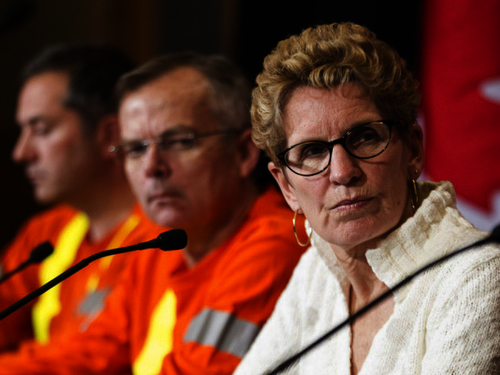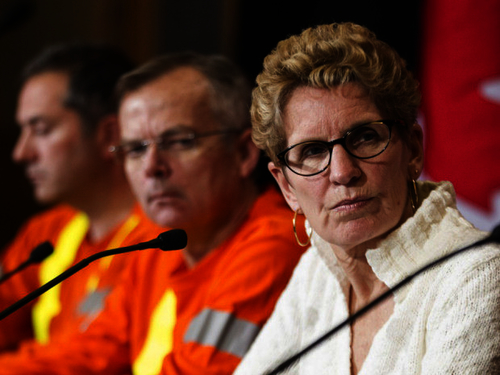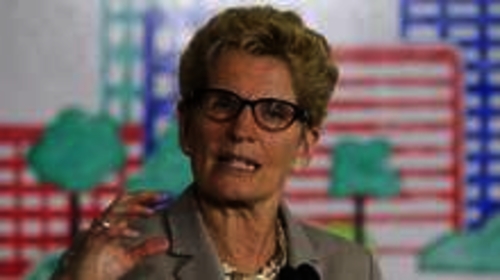There are two ways to diversify an economy: by responding to markets or by bureaucratic mandate. Smart governments will look to how the market is contributing to diversification in Canadian industry. Canada’s C-suite leaders, unfortunately, favour the bureaucratic mandate route, seeking more investment in the clusters of Toronto and Waterloo to drive more technology jobs. As recent history with BlackBerry (formerly RIM) has shown us, and before that Nortel, our country’s high-tech track record, so favoured by the diversify-by-decree set, is spotty at best. Rather than pump more money into sectors where the market is telling us it doesn’t want our products—or where we do not have a competitive advantage—a better strategy is to let the market illuminate a path to prosperity. In the case of Canada, that includes commodities and all of the ancillary skills, technologies and knowledge that are not only marketable but are in demand. Read the rest of this article at the Financial Post website.

Let Commodities Lead the Way
July 8, 2015

Dijkema and Dade in Financial Post: Let’s build on the ‘Canadian advantage’
In an article for the National Post today, Work and Economics director Brian Dijkema and Carlo Dade, Director of Trade & Investment Policy at the Canada West Foundation, say Canada needs to let commodities lead the way. "Rather than pump more money into sectors where the market is telling us it doesn’t want our products—or where we do not have a competitive advantage—a better strategy is to let the market illuminate a path to prosperity." Read more at the Financial Post Comment page.
July 8, 2015

Ray Pennings in National Post: Is the age-old debate between order and freedom essentially resolved?
Cardus executive vice president Ray Pennings was printed in today's National Post, discussing how "popular understanding of religion and its place in public life is undergoing radical change." Love of neighbour and love of country arise from our intense human attraction to fidelity—that is fides, faith. It is the rightful role of religious belief to cultivate faith in that which is most powerfully external to us—God—and then by extension through the “little platoons” of which we are all a part. For the past 30 years, this essential element of religious faith has been discarded in most of our public discourse. Doing so reflected a simplistic and un-nuanced understanding of religion, which has contributed to the present “illiberal” (to use the term in its classic sense) marginalization of people of faith from the mainstream of public life. To read the article, click here.
July 8, 2015

Social Conservatism, Diversity, and a Future
Find this article at the National Post website.
July 7, 2015

Why pay more for infrastructure?
Kathleen Wynne’s government is hoping to get Ontario moving down the road to a balanced budget by 2017-2018. The Liberals are counting on “the biggest infrastructure investment in Ontario’s history” to give the province a ride down that road. It’s a major trip: $130 billion over 10 years and the announcements are happening almost daily. Over $11 billion will go toward public infrastructure in the next two years, with large chunks of the money aimed at the Toronto and Hamilton areas. The trouble is that Ontario’s labour laws have given the province the equivalent of a slow leak in its tires. The lack of competition in an increasing number of major Ontario construction markets—including Toronto, Hamilton, and Waterloo—mean that we are not getting the mileage out of the money we are spending on public infrastructure. This means that Ontarians will either pay more for their water treatment plants and transit stations, or get less of them; likely both. Why the lack of competition? Ontario’s labour laws contain a clause that is unique in Canada. It prevents municipalities such as Toronto, Hamilton, and the Region of Waterloo, as well as agencies such as Ontario Power Generation, from accepting bids from all qualified contractors. Instead, the law forces municipalities to take bids from a set of companies that are affiliated with a subset of construction unions. Warnings have been sounded for years about this flawed approach to public expenditure—Cardus research suggests increases of 20 to 30 percent on billions of dollars of work—and little has been done about it. It appears we’re content to throw away hundreds of millions of extra dollars every year without anything to show it. Read the rest of this article at the National Post website.
June 13, 2015

Brian Dijkema in National Post: Why pay more for infrastructure?
In his opinion piece for the National Post yesterday, Work and Economics program director Brian Dijkema called for fair, open and competitive tendering in Ontario, particularly as $11 billion is scheduled to go toward its public infrastructure. Warnings have been sounded for years about this flawed approach to public expenditure—Cardus research suggests increases of 20 to 30 percent on billions of dollars of work—and little has been done about it. It appears we’re content to throw away hundreds of millions of extra dollars every year without anything to show it. The article is an introduction to the report published earlier this year by Cardus's Work and Economics program entitled "Tuning Up Ontario's Economic Engine," which studies the cost implications of closed tendering on the City of Toronto. Read the rest of this article at the National Post website.
June 13, 2015

How to break Ontario’s monopoly on education
On Wednesday, Premier Kathleen Wynne announced her intention to table back-to-work legislation to allow 70,000 students across Ontario to return to school. This follows a predictable pattern—teachers strike, parents and students suffer, and then the government intercedes without addressing the root issues. According to the Canadian Foundation for Labour Rights, Ontario is now the national leader in forcing striking workers back to work with legislation. Each time this happens students miss school, teachers miss work, and parents are left wondering what, exactly, their tax dollars buy them. Clearly something is wrong. Read the rest of Van Pelt's opinion piece at the Globe and Mail website.
May 26, 2015

Of Magazines and Communities
May 26, 2015

Michael Van Pelt: ‘Students are losing by not learning’
Cardus president Michael Van Pelt appeared on Hamilton's AM900 last night to discuss the article he wrote for The Globe and Mail yesterday: "How to break Ontario's monopoly on education."Van Pelt explains: Premier Wynne is about to do what collective bargaining agreements should never, ever have to do; she's interfering with a robust collective bargaining agreement and using her power to essentially break the contract. No one in the labour movement can support that kind of thing. ... Create competitive environments where you can have robust collective bargaining without the power differentials of near-monopolies like we have here—this would be a win/win for everybody.Learn more about the Cardus Education program's recent report on Onatrio's education system: "Toward a Warmer Climate for Ontario's Private Schools."
May 26, 2015
